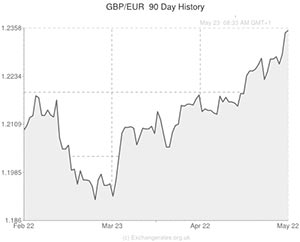
The Pound to Euro exchange rate (GBP/EUR) is currently fluctuating close to a 17-month high of 1.2366 due to hopes that the Bank of England could raise interest rates over the next 12 months. Concerns that the European Central Bank is going to loosen monetary policy in June are also contributing to Euro weakness.
Earlier this week the BoE released the minutes from its latest meeting. The report showed that contrary to recent comments from Governor Mark Carney, some policymakers are starting to consider the possibility of raising the benchmark interest rate from its 5-year slumber at 0.50%.
Carney attempted to pour cold water on rate hike bets last week when he claimed that the Monetary Policy Committee is worried about the level of self-employment in Britain, which he said could be masking the substantial level of slack that is still present in the UK labour market.
However, Wednesday’s BoE minutes painted a very different picture of MPC sentiment. It now looks possible that the most hawkish members of the committee could start to vote for a tightening of monetary policy in the near future. The Governor had received the full support of the nine-man team in his first ten months at the helm of the bank but it seems that policymakers are beginning to show, in the words of the BoE, “a variety of views on the appropriate path of monetary policy”.
Yesterday it was reported that British exports fell by -1.0% in the first quarter but that GDP still grew by 0.8% due to strong household consumption numbers and accelerating business investment. Demand for Sterling cooled slightly following the release but it is unlikely that investors will read too much into the data considering that recent indicators have continued to impress.
ECB easing
With Eurozone inflation still weak at 0.7% and growth fairly tepid throughout the currency bloc – Germany aside – it is beginning to look like a foregone conclusion that the European Central Bank will announce fresh stimulus measures next month.
During his most recent policy statement ECB Chief Mario Draghi told reporters that the Governing Council is “comfortable acting next time” and that “further monetary policy easing” could be introduced if required.
Since that statement on May 8th investors have been pricing in some form of monetary loosening in June. This has taken its toll on the single currency, helping the Pound reach a 17-month high against the Euro.
Yesterday it was reported that France – the purported ‘sick man of Europe’ – dragged Eurozone manufacturing output down from 53.4 to 52.5 during May. The disappointing 49.3 French PMI print, combined with news that output prices across the entire currency bloc fell for the 26th month in a row, bolstered the argument for ECB action next month.
The question is: what will it take to drive GBP to Euro all the way to 1.2500?
Markets are primed for a drop in the benchmark ECB interest rate to 0.15% and a reduction in the deposit rate to -0.1%. This means that the single currency is unlikely to plunge too steeply if these are the only measures announced.
However, there is potential for further Euro losses if the ECB opts for a triple threat of cutting the benchmark, bringing the deposit into negative territory and unleashing a QE-style bond-buying scheme.
Under this circumstance, and assuming that British data continues to come in optimistically, it is possible that the Pound to Euro exchange rate could rally towards 1.2500 this summer.

Comments are closed.